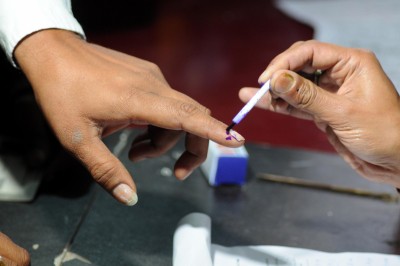
Amaravati, In the recent panchayat elections in Andhra Pradesh, several Dalit contestants and their families in the constituencies reserved for them suffered losses to the tune of lakhs of rupees due to the lack of unity.
Majority of these communities are already stricken with poverty and the polls set these contestants back by a few more lakhs of rupees as the polls compelled them to splurge a lifetime's savings.
Though the rural local bodies' polls are mandated to be strictly on non-political party basis, in reality, every move is controlled by the political parties.
In case of constituencies without any reservation, it is always the affluent upper caste communities who can afford to spend a fortune and compete in the polls, which is mostly not the case with Dalits.
"You will mostly not find a Dalit contesting a sarpanch election when it is not reserved under SC category," Kumar told IANS, whose family fought in the just concluded polls in a village in West Godavari district.
Whether it is general or reserved, political parties' constituency in-charge or other senior leaders decide who will unofficially represent the party. Once this job is done, comes the burden of canvassing, spending money on publicity material, liquor and bribing the voters.
However, if the election is unanimous then there will be only one contestant in fray and a high possibility of saving money.
But in the event of multiple candidates, all of them will be compelled to please the voters by distributing liquor and money, drilling a hole in all of the contestants' pockets.
In Kalla major panchayat in West Godavari district, the sarpanch post was reserved for the SC community. Initially there was an uncertainty as who would be the candidate aligned to the ruling Yuvajana Sramika Rythu Congress Party (YSRCP).
After a few days of uncertainty, the party zeroed in on Lakshmi Bai as the candidate while another candidate who also desired the party's endorsement entered the fray as an independent and YSRCP considered him as a rebel candidate.
Meanwhile, Janasena party leaders were hunting for a Dalit to fight the election with their endorsement, enlarging the field into a triangular contest.
Finally on the election day, all three contested and the Janasena candidate emerged victorious, leaving the other two with empty pockets.
All the upper caste villagers who number more than the Dalits stood united and voted for the Janasena candidate, propelling her to victory.
Incidentally, many youngsters threatened their family members that they will commit suicide if they do not vote for Janasena, including forcing them to swear.
The independent candidate and the YSRCP backed contestant burned up around Rs 20 lakh and Rs 18 lakh, respectively.
And the sad part, both the families are not well-off and Rs 20 lakh is princely sum to lose.
The Janasena candidate may have won the election but her role is ceremonial, as the upper caste people will call the shots, relegating the winner to the sidelines. It is the same case even if the YSRCP candidate or any other party aligned candidate wins the election.
Though the Dalits could unite and project one single candidate, they willingly concede this autonomy to other communities to decide which Dalit should contest.
"Because our Dalits are not united, others are taking advantage of us. Especially in reserved villages, Dalits are getting divided. When they are divided, they obviously weaken," noted MVR Murthy, an anesthetist from Kakinada.
He said Dalits are failing to organise and highlighted how they can fight for themselves when the need arises.
"While we are the majority in some of the villages, still people are able to control us," said Murthy, citing the case of another such village in the East Godavari district.
He said five Dalits competed for one sarpanch post in Nedunuru village in East Godavari's Ainavilli mandal, all of them splurging around Rs 5 lakh each.
In this case, Dalits were pitted by vested interests to eat into another Dalit's vote share. Eventually, a YSRCP aligned candidate won the election in Nedunuru.
None of these Dalits got money from the party or the upper caste people who motivated them to contest the election.
"Lack of education is the main cause among the Dalits. By education I don't mean literacy, wisdom. Whatever B.R. Ambedkar has taught did not percolate into the roots. It is stopping with a few educated Dalits discussing and nothing beyond," added the anesthetist.
Similar scenes played out in Matsyapuri village recently, proving the cost of this disunity among the oppressed communities.
Just like in Kalla and Nedunuru, Dalits were pitted against Dalits and the Janasena backed candidate's victory procession lead to skirmishes.
The controversy did not end there, it blew up, with the local YSRCP Bhimavaram MLA Grandhi Srinivas rushing to the village and later Janasena party founder Pawan Kalyan himself involving in the claims, counter claims and accusations.
Now that the panchayat polls are over, there is ample time for people to introspect and weigh the benefits of unity.


.jpeg)

